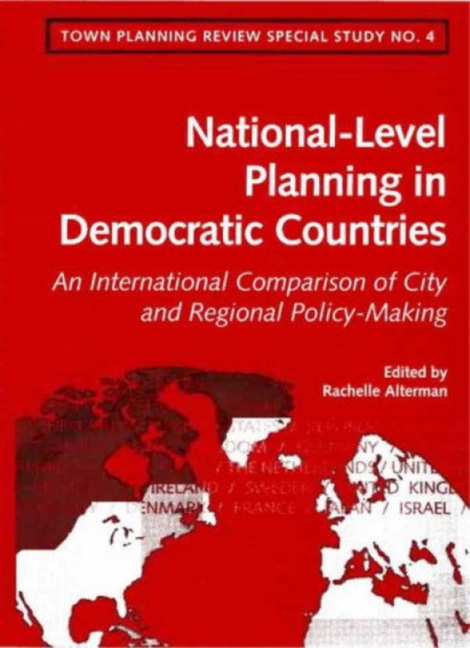 National-Level Spatial Planning in Democratic Countries
National-Level Spatial Planning in Democratic Countries Book contents
- Frontmatter
- Dedication
- Contents
- List of Figures
- List of Tables
- Preface
- About the Contributors
- 1 National-Level Planning in Democratic Countries: A Comparative Perspective
- 2 National Land-Use Planning and Regulation in the United States: Understanding its Fundamental Importance
- 3 Structures for Policy-Making and the Implementation of Planning in the Republic of Ireland
- 4 Rethinking Swedish National Planning
- 5 National-Level Institutions and Decision-Making Processes for Spatial Planning in the United Kingdom
- 6 National-Level Planning Institutions and Decisions in the Federal Republic of Germany
- 7 National-Level Planning in the Danish System
- 8 National-Level Planning Institutions and Decision-Making in France
- 9 National-Level Economic and Spatial Planning in Japan
- 10 Dutch National Planning at the Turning Point: Rethinking Institutional Arrangements
- 11 National-Level Planning in Israel: Walking the Tightrope Between Government Control and Privatisation
1 - National-Level Planning in Democratic Countries: A Comparative Perspective
- Frontmatter
- Dedication
- Contents
- List of Figures
- List of Tables
- Preface
- About the Contributors
- 1 National-Level Planning in Democratic Countries: A Comparative Perspective
- 2 National Land-Use Planning and Regulation in the United States: Understanding its Fundamental Importance
- 3 Structures for Policy-Making and the Implementation of Planning in the Republic of Ireland
- 4 Rethinking Swedish National Planning
- 5 National-Level Institutions and Decision-Making Processes for Spatial Planning in the United Kingdom
- 6 National-Level Planning Institutions and Decisions in the Federal Republic of Germany
- 7 National-Level Planning in the Danish System
- 8 National-Level Planning Institutions and Decision-Making in France
- 9 National-Level Economic and Spatial Planning in Japan
- 10 Dutch National Planning at the Turning Point: Rethinking Institutional Arrangements
- 11 National-Level Planning in Israel: Walking the Tightrope Between Government Control and Privatisation
Summary
National-level planning in democratic countries has been almost all but ignored by researchers in urban and regional planning since the reconstruction years following the Second World War. Having become identified in many people's eyes with communist regimes and coercive government practices, national-level planning fell into some disrepute. Yet, this book will show that planning is carried out on the national level to some degree in each and every one of the ten countries studied, even though the goals, degree of comprehensiveness, subjects, institutions, format, powers and effectiveness differ widely from country to country. There are even modest trends whereby, on the threshold of the twenty-first century, national-level planning is growing in importance in democratic, advanced-economy countries. These trends point to the need to revisit planning theory.
Why study national-level planning?
Little attention has been given to the study of national-level planning in Western countries for many decades. The attention of planning theorists in recent years, as expressed in the majority of topics for empirical research and the themes of normative debate, has tended to focus on decision-making modes relevant more to the local and individual levels than to the national one. The three compendiums of planning theory published in the 1990s (Campbell and Fainstein, 1996; Mandelbaum et al., 1996; Stein, 1995) do not include even a single chapter devoted to the types of issues, institutions and modes of decision-making typical of national-level planning.
This book was born of necessity. It is not the result of a library search for lacunae in knowledge, but of a real-life need for knowledge about how different countries handle their land-use (or ‘spatial’) planning issues at the national level. The need was Israel's—a country that ostensibly already has a high degree of national-level planning, but where a group of planners and academics involved in the ambitious ‘Israel 2020’ planning team was seeking to know more about alternative modes of national-level planning. I began to search the literature for ideas.
- Type
- Chapter
- Information
- National-Level Spatial Planning in Democratic CountriesAn International Comparison of City and Regional Policy-Making, pp. 1 - 42Publisher: Liverpool University PressPrint publication year: 2001


